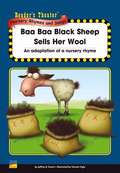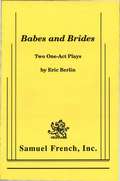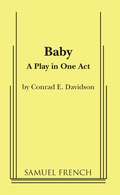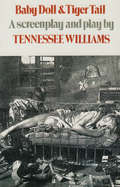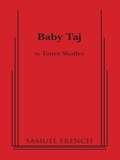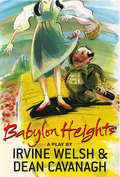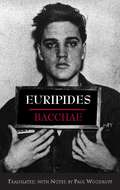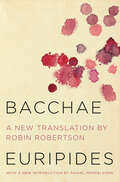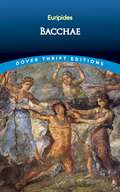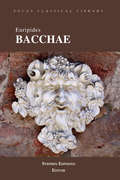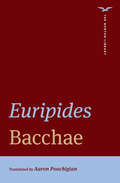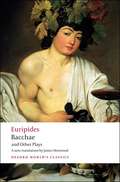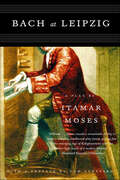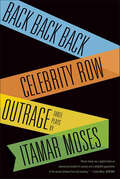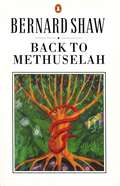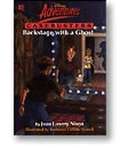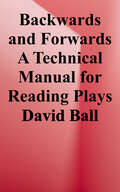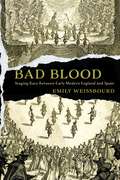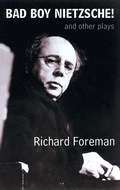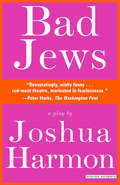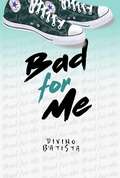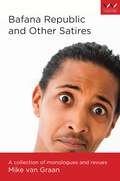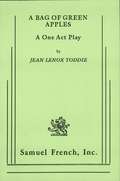- Table View
- List View
Ba mo nyakele kae
by Mj Mokaba"Nepokgolo ya padi ye ke go re ruta se sengwe ka ga bophelo le go kgala mekgwa ya go se loke yeo batho ba e dirago. Ga se sephiri gore tšeo di tšweletšwago ka mo gare ga padi ye ke ditiragalo tšeo di diregago bathong ebile di diregelago batho".
Ba mo nyakele kae: UBC Uncontracted
by Mj Mokaba"Nepokgolo ya padi ye ke go re ruta se sengwe ka ga bophelo le go kgala mekgwa ya go se loke yeo batho ba e dirago. Ga se sephiri gore tšeo di tšweletšwago ka mo gare ga padi ye ke ditiragalo tšeo di diregago bathong ebile di diregelago batho".
Baa Baa Black Sheep Sells Her Wool: An Adaptation of a Nursery Rhyme
by Jeffrey B. FuerstNIMAC-sourced textbook
Babes And Brides
by Eric BerlinA collection of two short plays. In the first of these one act comedies, The Line That's Picked Up 1000 Babes And How It Can Work for You!, six people in a bar are in search of companionship, a one night stand or a life-long relationship. Benny is employing the title handbook while his friend Alan insists that women don't fall for pick up lines. There are surprises for everyone at the bar tonight. In The Midnight Moonlight Wedding Chapel, Peter and Walter are vacationing in Las Vegas. Peter gets drunk with a cocktail waitress and they decide to marry, enjoy a one night honeymoon, and divorce the next day. When he wakes up his bride has vanished. Both plays are well suited for scene work. FEE: $35 per performance, per play.
Baby
by Conrad E. DavidsonComedy / 4m, 4f, 4 m or f / In this fast paced play Baby completely forgets his (or her) pre baby training and is completely overwhelmed by adults from birth to the first birthday. Bad breath in the face, being tossed high into the air, and unwanted vocabulary lessons assail the infant before Baby is coached to employ tricks that drive adults to distraction.
Baby Doll & Tiger Tail: A screenplay and play by Tennessee Williams
by Tennessee WilliamsA taut, vivid drama of a voluptuous child-bridge who refuses to consummate her marriage to an older, down-on-his-luck cotton-gin owner. In 1956, Time magazine called Tennessee Williams' Baby Doll "just possibly the dirtiest American-made motion picture that has ever been legally exhibited." The taut, vivid drama of a voluptuous child-bridge, who refuses to consummate her marriage to an older, down-on-his-luck cotton-gin owner in Tiger Tail County, Mississippi until she is "ready," has gained in humor and pathos over the years as society has caught up with the author's savagely honest view of bigotry and lust in the rural South. But Tennessee Williams was first and foremost a writer for the stage, and this reissue of his original screenplay for the Elia Kazan movie of Baby Doll is now accompanied by the script of the full-length stage play, Tiger Tail, developed from that screenplay during the '70s. The text, which incorporates the author's final revisions, records the play as it was produced at the Hippodrome Theatre Workshop in Gainesville, Florida, in 1979.
Baby Taj
by Tanya ShafferComedy / Characters: 2m, 3f / "I've dreamed you for so long, I can hardly believe you're with me now. Yet here you are: a tiny human voyager, sleeping off the shock of migration..." The legendary Taj Mahal is the next assignment for Rachel, an American travel writer whose failed romances have led her to ask: Why not have the baby she craves - on her own? She finds unexpected answers - and larger questions - among the glittering legacies of India's past. Alive with the sounds and colors of a remarkable country, this bittersweet comedy of mischievous matchmaking raises provocative questions about love, friendship, family, and what it means to be ready to be a parent. Baby Taj had developmental readings at Jeffrey Bihr Studio in Berkeley, California; The Lark Theatre in New York City; and TheatreWorks in Mountain View, California. It premiered at TheatreWorks in October, 2005, in a production directed by Matt August, to great critical acclaim. It was selected as one of the Top Ten Shows of the Year by the San Francisco Chronicle, the Oakland Tribune, and the San Jose Mercury News, and nominated for an American Theatre Critics' Association Steinberg Award and a Bay Area Theatre Critics' Award. "A captivating inquiry into love and freedom... Thrives on a witty, probing clash between freethinking modernity and tradition." -Robert Hurwitt, San Francisco Chronicle "A bundle of cross-cultural joy... Marries the breezy cynicism of the now with the eternal power of India... [Shaffer's] ear for mod-groovy lingo gives the play a to-die-for sparkle." -Karen D'Souza, San Jose Mercury News "...Filled with a savvy traveler's enthusiasm for the cultural and historical rewards of her journey." -Chad Jones, Oakland Tribune "...Depicts the characters in all their contradictions and with such clarity that t
Babylon Heights
by Irvine Welsh Dean CavanaghIf you put four dwarfs in a room with enough opium and alcohol, it's bound to end in tears. In 1935, MGM studios embarked on a movie adaptation of L. Frank Baum's The Wizard of Oz. The production called for the casting of many dwarfs to play the Munchkins of the mythical Land of Oz, and the studio began recruiting 'small persons' from all over the world. During production, rumors spread around Hollywood of wild Munchkin sex orgies, drunken behavior and general dwarf debauchery. More sinisterly, a Munchkin is said to have committed suicide by hanging himself on the set during filming--what appears to be a small human body is clearly visible hanging from a tree in the Tin Man scene. It is a claim that has passed into Hollywood legend. Set in a hotel room in Culver City, California, Babylon Heights is Irvine Welsh and Dean Cavanagh's scabrous and hilarious imaging of what could, very possibly, have led to the dwarf suicide.
Bacchae
by Euripides Paul Woodruff[Woodruff's translation] is clear, fluent, and vigorous, well thought out, readable and forceful. The rhythms are right, ever-present but not too insistent or obvious. It can be spoken instead of read and so is viable as an acting version; and it keeps the lines of the plot well focused. The Introduction offers a good survey of critical approaches. The notes at the foot of the page are suitably brief and nonintrusive and give basic information for the non-specialist. --Charles Segal, Harvard University
Bacchae
by EuripidesA bold new translation of Euripides' shockingly modern classic work, from Forward Prize-winning poet Robin Robertson, with a new preface by bestselling and award-winning writer, critic, and translator Daniel MendelsohnThebes has been rocked by the arrival of Dionysus, the god of wine and ecstasy. Drawn by the god's power, the women of the city have rushed to worship him on the mountain, drinking and dancing with frenzied abandon.Pentheus, the king of Thebes, is furious, denouncing this so-called god as a charlatan and an insurgent. But no mortal can deny a god, much less one as powerful and seductive as Dionysus, who will exact a terrible revenge on Pentheus, drawing the king to his own tragic destruction.This stunning translation by award-winning poet Robin Robertson reinvigorates Euripides' masterpiece. Updating it for contemporary readers, he brings the ancient verse to fervid, brutal life, revealing a work of art as devastating and relevant today as it was in the fifth century BC.
Bacchae (Dover Thrift Editions)
by EuripidesClassic Greek tragedy concerns the catastrophe that ensues when the King of Thebes imprisons Dionysus and attempts to suppress his cult. Full of striking scenes, frenzied emotion, and choral songs of great power and beauty, the play is a fine example of Euripides' ability to exploit Greek myth to probe human psychology.
Bacchae (Focus Classical Library)
by EuripidesAn English translation of Euripides' tragedy based on the mythological story of King Pentheus of Thebes and his fateful encounter with the god DIonysus. Includes an introductory essay, extensive notes, appendices on lacuna, a geneological chart of the gods, and an essay by Valerie M. Warrior: "The Roman Bid to Control Bacchic Worship". The Focus Classical Library provides close translations with notes and essays to provide access to understanding Greek culture and the roots of contemprary thought.
Bacchae (The Norton Library #0)
by EuripidesAbout Aaron Poochigian’s translation “Poochigian’s translation is a triumph—a remarkably lucid and vibrant rendition . . . The script’s language is precise yet sonorous, expertly constructed in iambic pentameter to both moving and chilling effect.” --Aram Kouyoumdjian, Asbarez “By far the most theatrically assured rendition of the play I’ve encountered. The fluid translation by Aaron Poochigian is as mercurial as the staging.” --Charles McNulty, The Los Angeles Times
Bacchae and Other Plays (Oxford World's Classics)
by James Morwood Edith Hall EurípidesThe four plays newly translated for this volume are among Euripides most exciting works. Iphigenia among the Taurians is a story of escape contrasting Greek and barbarian civilization, set on the Black Sea at the edge of the known world. Bacchae, a profound exploration of the human psyche, deals with the appalling consequences of resistance to Dionysus, god of wine and unfettered emotion. Iphigenia at Aulis centers on the ultimate dysfunctional family as emotion is tested in the crucible of the Greek expedition against Troy. And Rhesus, probably the work of another playwright, is an action-packed Iliad in miniature, dealing with a grisly event in the Trojan War.
Bach at Leipzig: A Play
by Itamar MosesLeipzig, Germany, 1722: Johann Kuhnau, revered organist of the Thomaskirche, suddenly dies, leaving his post vacant. In order to fill the position, the city council invites a small number of musicians to audition for the appointment, including Johann Sebastian Bach. This, however, is not his story. Based on actual events, Bach at Leipzig imagines with uncommon intelligence and wit how six little-known musicians resorted to bribery, blackmail, and betrayal in an attempt to secure the most coveted musical post in all of Europe.
Back Back Back; Celebrity Row; Outrage: Three Plays
by Itamar MosesItamar Moses has been hailed as one of America's most talented young playwrights since his critically acclaimed Bach at Leipzig debuted in 2005. In this anthology of three new plays, Moses blurs the line between fact and fiction, dramatizing today's most infamous news stories. In Back Back Back, the pressures of performance and reputation get the best of three professional baseball players when they are forced to reveal their not-so-natural secrets to winning the game. In Celebrity Row, Moses imagines what Timothy McVeigh, Ted Kaczynski, the 1993 World Trade Center bomber Ramzi Yousef, and the Latin Kings leader Luis Felipe would have philosophized about when they were inhabitants of the same maximum security prison in Colorado. Finally, in Outrage, the dangerous teacher-disciple relationship calls all of academia into question with the help of none other than Socrates and Bertolt Brecht.
Back to Methuselah
by George Bernard ShawBack to Methuselah (A Metabiological Pentateuch) is a 1921 series of five plays and a preface by George Bernard Shaw. The five plays are:In the Beginning: B.C. 4004 (In the Garden of Eden); The Gospel of the Brothers Barnabas: Present Day; The Thing Happens: A.D. 2170; Tragedy of an Elderly Gentleman: A.D. 3000; As Far as Thought Can Reach: A.D. 31,920 The plays were published with a preface titled The Infidel Half Century, and first performed in 1922 by the New York Theatre Guild at the Garrick Theatre.
Backstage with a Ghost
by Joan Lowery NixonBrian and Sean investigate a series of suspicious accidents at a theater waiting to be torn down.
Backwards and Forwards: A Technical Manual for Reading Plays
by David BallConsidered an essential text since its publication thirty-five years ago, this guide for students and practitioners of both theater and literature complements, rather than contradicts or repeats, traditional methods of literary analysis of scripts. <p><p>The author developed his method during his work as literary director at the Guthrie Theater, building his guide on the crafts playwrights of every period and style use to make their plays stage-worthy. The text is full of tools for students and practitioners to use as they investigate plot, character, theme, exposition, imagery, conflict, theatricality, and the other crucial parts of the superstructure of a play. <p><p>Also included are guides for discovering what the playwright considers a play' s most important elements, thus permitting interpretation based on the foundation of the play rather than its details. Using Shakespeare's Hamlet as illustration, the author assures a familiar base for clarifying script-reading techniques as well as exemplifying the kinds of misinterpretation readers can fall prey to by ignoring the craft of the playwright. Of immense utility to those who want to put plays on the stage (actors, directors, designers, production specialists) Backwards & Forwards is also a fine playwriting manual because the structures it describes are the primary tools of the playwright.
Bad Blood: Staging Race Between Early Modern England and Spain (RaceB4Race: Critical Race Studies of the Premodern)
by Emily WeissbourdBad Blood explores representations of race in early modern English and Spanish literature, especially drama. It addresses two different forms of racial ideology: one concerned with racialized religious difference—that is, the notion of having Jewish or Muslim “blood”—and one concerned with Blackness and whiteness. Shakespeare’s Othello tells us that he was “sold to slavery” in his youth, a phrase that evokes the Atlantic triangle trade for readers today. For many years, however, scholars have asserted that racialized slavery was not yet widely understood in early modern England, and that the kind of enslavement that Othello describes is related to Christian-Muslim conflict in the Mediterranean rather than the rise of the racialized enslavement of Afro-diasporic subjects.Bad Blood offers a new account of early modern race by tracing the development of European racial vocabularies from Spain to England. Dispelling assumptions, stemming from Spain’s historical exclusion of Jews and Muslims, that premodern racial ideology focused on religious difference and purity of blood more than color, Emily Weissbourd argues that the context of the Atlantic slave trade is indispensable to understanding race in early modern Spanish and English literature alike. Through readings of plays by Shakespeare, Lope de Vega, and their contemporaries, as well as Spanish picaresque fiction and its English translations, Weissbourd reveals how ideologies of racialized slavery as well as religious difference come to England via Spain, and how both notions of race operate in conjunction to shore up fantasies of Blackness, whiteness, and “pure blood.” The enslavement of Black Africans, Weissbourd shows, is inextricable from the staging of race in early modern literature.
Bad Boy Nietzsche! and Other Plays
by Richard ForemanRichard Foreman has been at the leading edge of the theatrical avant-garde in the United States and throughout the world since 1968. His legendary productions, written and directed by him at his Ontological-Hysteric Theatre have influenced two generations of theater artists. This new anthology collects plays written and performed over six years, including Now That Communism Is Dead My Life Feels Empty, Maria del Bosco, Panic (How to Be Happy!), Bad Boy Nietzsche!, Bad Behavior and King Cowboy Rufus Rules the Universe.Richard Foreman founded the Ontological-Hysteric Theatre in 1968. The theater is currently in the historic St. Marks Church, where he rehearses and produces one of his new plays each year, each play performing for 16 weeks every winter.
Bad Jews: A Play
by Joshua HarmonIt's about what you choose to believe, when you're chosen. Bad Jews tells the story of Daphna Feygenbaum, a “Real Jew” with an Israeli boyfriend. When Daphna’s cousin Liam brings home his shiksa girlfriend Melody and declares ownership of their grandfather’s Chai necklace, a vicious and hilarious brawl over family, faith and legacy ensues.
Bad for me
by Divino B'AtistaLuck seems to be in Matthew's favor as soon as he gets a job at the restaurant where Andrew, the boy of his dreams, works. Being the incurable romantic he is, Matthew faithfully believes that he can turn friendship into a long-awaited romance, the problem is that life is full of surprises, and one of them will completely shake the boy's heart, making him understand that love is not always simple and pink as we imagine. Bad for Me is a light story with an engaging and humorous plot that will make the reader laugh and thrill to the last page
Bafana Republic and Other Satires: A collection of monologues and revues
by Mike van GraanThis collection of satirical sketches takes readers on a sometimes cynical, sometimes hilarious trip through many of the issues that face democratic South AfricaThe seed of this collection was sown in 2007 when South Africa won the right to host the 2010 FIFA World Cup. The debate about huge amounts of public funds being spent on a 'vanity project' instead of being used to improve the lives of the majority of the country’s citizens inspired Mike van Graan, one of South Africa's leading contemporary political playwrights, to use sport as an entry point for satirical commentary. Van Graan follows this with piercing attention towards matters of the state. With themes ranging from the World Cup to the political football of land, from the violent abuse of women to state capture, this selection of satirical sketches takes readers on a rollercoaster trip through many of the issues that face democratic South Africa. The sketches come from six one-person revues, Bafana Republic (2007), Bafana Republic: Extra Time (2008), Bafana Republic: Penalty Shootout (2009), Pay Back the Curry (2016), State Fracture (2017) and Land Acts (2018). Van Graan uses a potent mix of comedy, poetry and drama to make points that hit hard at core issues which 21st-century South Africans are struggling with. Readers will laugh and cringe and sometimes cry, but one thing they will not be able to do is remain unaffected.
Bag Of Green Apples
by Jean Lennox ToddiePatricia, a young woman of twenty, returns to the scene of her childhood-- her aunt Ester's beach house. She hopes to learn from her aunt, who raised her, answers about her past so that she can better understand who she is in the present. She interacts with Patty (her ten year old self) as well as with Ester of past and present. She finally decides to stay. FEE: $35 per performance.

